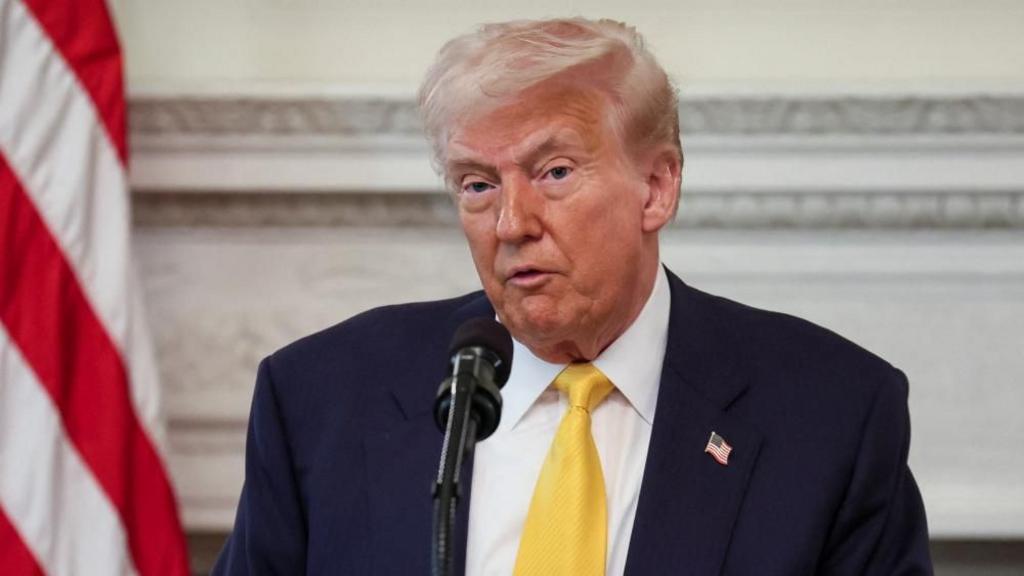World
Trump Offers South Korean Workers Chance to Stay in US, Few Accept

President Donald Trump has extended an offer to allow hundreds of South Korean workers detained in an immigration raid to remain in the United States and assist in training American employees. Despite this opportunity, only one worker has opted to stay, according to South Korean officials.
The president’s intervention resulted in a temporary delay of a chartered flight that was set to return these workers. The flight, originally scheduled to depart earlier in the week, was rescheduled for Thursday, March 15, 2024. Approximately 300 South Korean nationals were among those arrested during an operation at the site of a major project in Georgia, where Hyundai Motor and LG Energy Solution are constructing a $4.3 billion electric vehicle battery plant.
In response to the situation, South Korean President Lee Jae Myung stated that the repatriation process had been paused while officials evaluated Trump’s proposal. A South Korean foreign ministry official revealed that Trump directed U.S. officials to “encourage” the workers to remain in the country, suggesting they could contribute by training or educating American workers.
Despite this offer, South Korean Foreign Minister Cho Hyun emphasized the importance of returning home first. During a meeting with U.S. Secretary of State Marco Rubio in Washington, Cho noted, “They can recover and then return if they wish.”
The White House, along with the Departments of State and Homeland Security, has not commented on this matter. Reports from Yonhap news agency indicate that the workers will not be handcuffed during their transport from detention to the airport, a notable change from the typical practices of U.S. immigration authorities.
This incident has raised significant concerns in South Korea, prompting worries about the investment climate for Korean companies in the U.S. Business leaders have criticized the stringent American visa restrictions for skilled foreign workers. They argue that these regulations hinder the ability to quickly send experts to oversee complex projects like advanced manufacturing plants and to train local staff effectively.
As the situation unfolds, it remains to be seen how this will impact future investments and the perception of South Korean businesses operating in the United States. The potential for collaboration and knowledge transfer is crucial for both nations, especially in the rapidly evolving automotive and energy sectors.
-

 Health3 months ago
Health3 months agoNeurologist Warns Excessive Use of Supplements Can Harm Brain
-

 Health3 months ago
Health3 months agoFiona Phillips’ Husband Shares Heartfelt Update on Her Alzheimer’s Journey
-

 Science1 month ago
Science1 month agoBrian Cox Addresses Claims of Alien Probe in 3I/ATLAS Discovery
-

 Science1 month ago
Science1 month agoNASA Investigates Unusual Comet 3I/ATLAS; New Findings Emerge
-

 Science4 weeks ago
Science4 weeks agoScientists Examine 3I/ATLAS: Alien Artifact or Cosmic Oddity?
-

 Entertainment4 months ago
Entertainment4 months agoKerry Katona Discusses Future Baby Plans and Brian McFadden’s Wedding
-

 Science4 weeks ago
Science4 weeks agoNASA Investigates Speedy Object 3I/ATLAS, Sparking Speculation
-

 Entertainment4 months ago
Entertainment4 months agoEmmerdale Faces Tension as Dylan and April’s Lives Hang in the Balance
-

 World3 months ago
World3 months agoCole Palmer’s Cryptic Message to Kobbie Mainoo Following Loan Talks
-

 Science4 weeks ago
Science4 weeks agoNASA Scientists Explore Origins of 3I/ATLAS, a Fast-Moving Visitor
-

 Entertainment4 months ago
Entertainment4 months agoLove Island Star Toni Laite’s Mother Expresses Disappointment Over Coupling Decision
-

 Entertainment3 months ago
Entertainment3 months agoMajor Cast Changes at Coronation Street: Exits and Returns in 2025









